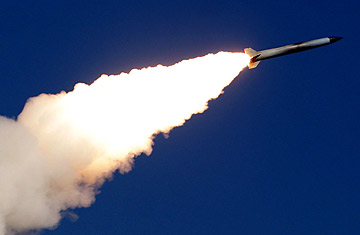
Antiaircraft missile launched during a NATO air-defense exercise
For the past few years, the people of Trokavec, Czech Republic, have been convinced that America was positioning their quiet town of about 100, an hour south of Prague, at the center of a giant bull's eye.
So when news was confirmed that the U.S. had scrapped plans to place part of a missile-defense shield in a military zone near the town, Jan Neoral, the mayor of Trokavec and a vocal anti-missile-shield campaigner, announced with uncharacteristic understatement that President Barack Obama's decision was "a satisfaction."
And most people in the Czech Republic agree with him. Repeated polls have found that more than 60% of the country opposes the construction of radar facilities within its borders. Many feared that the U.S. missile-defense system would destabilize security by provoking Russia, which has long been against the building of the shield, and making the Czech Republic a target for an Iranian first strike. "Seventy percent of people in the Czech Republic will certainly welcome [this decision],"said Social Democratic leader Jiri Paroubek, whose party had opposed the radar, citing recent polls. "I think it will raise the United States' prestige."
But not every Czech feels this way. Proponents of the radar — mostly conservative politicians from the former center-right government that recently lost power — are openly angry with the decision and are concerned that the U.S. has acquiesced to Russia's demands that the system be scrapped. Ex-Premier Mirek Topolanek, whose government fell in March, said the decision showed that the U.S. no longer cares about the security of central Europe. While in power, Topolanek had supported the system against public opinion, because he felt the presence of U.S. military technology was a physical manifestation of the determination that central Europe would never return to Russia's sphere of influence.
Jan Vidim, head of the lower house defense committee and a lawmaker for Topolanek's Civic Democrats, said the removal of the defense system was a blow to Czech interests. "The first feeling is a great disappointment and disgust over Mr. Obama's cowardice," Vidim said, according to the website of the daily Lidove Noviny. "He performs endless concessions, for example towards Russia. I consider it a betrayal of allies."
Elsewhere in Europe, the reaction to the announcement was mixed:
Poland
In Warsaw, where on Thursday, Sept. 17, Poles marked the 70th anniversary of the Soviet Union's invasion of the country, Prime Minister Donald Tusk told the Associated Press that Obama had assured him in a phone call that plans to alter the missile-defense project would not hurt Poland's security. But some were skeptical. "It's not good," former Polish President and Solidarity leader Lech Walesa told the AP. "I can see what kind of policy the Obama Administration is pursuing towards this part of Europe. The way we are being approached needs to change." Aleksander Szczyglo, head of Poland's National Security Office, characterized the change as a "defeat primarily of American long-distance thinking about the situation in this part of Europe."
Russia
The Kremlin did not immediately give an official reaction, but not surprisingly, senior Russian officials expressed support for the move. "It's like having a decomposing corpse in your flat, and then the undertaker comes and takes it away," said Dmitry Rogozin, Russia's ambassador to NATO, according to the BBC. "This means we're getting rid of one of those niggling problems which prevented us from doing the real work."
NATO
In Brussels, NATO Secretary-General Anders Fogh Rasmussen welcomed the U.S. decision, a sentiment echoed in a statement released by Britain's Foreign Office, which said the announcement "confirms the close cooperation between the U.S. and NATO allies on developing antimissile systems." Rasmussen also said missile defense would continue in an altered form. "It is my clear impression that the American plan on missile defense will involve NATO ... to a higher degree in the future," the AP reported him as saying. "This is a positive step in the direction of an inclusive and transparent process, which I also think is in the interest of ... the NATO alliance."
